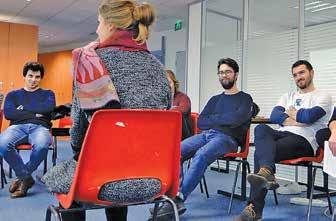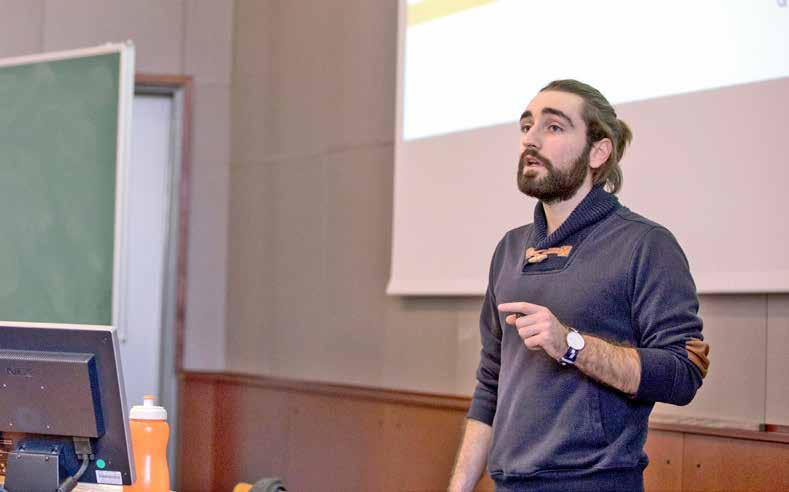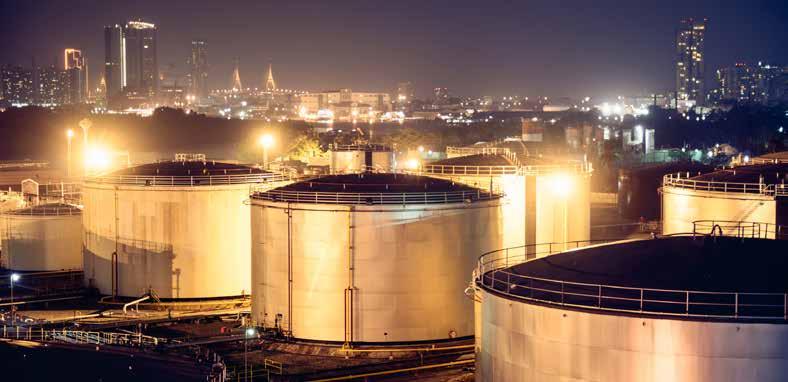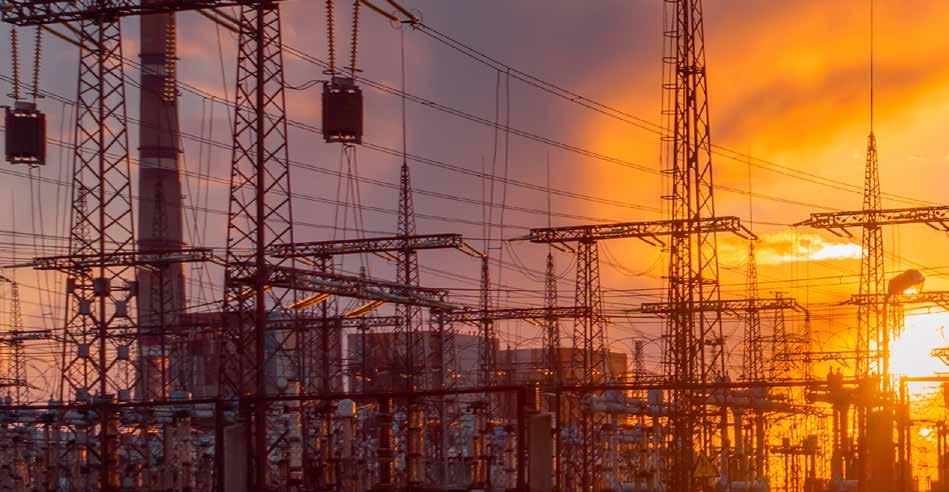
6 minute read
Albéric Barret
Ante el cambio climático, sobriedad energética
El activista europeo Albéric Barret compartió su visión sobre la actual crisis climática; mediante conceptos como sobriedad energética y justicia ambiental, proporcionó diversas soluciones a los peligros climáticos vigentes. Barret pertenece a la asociación francesa Avenir Climatique (AC), dedicada al activismo ambiental en el sector energético.
Energy Sobriety for Facing Climate Change
From his perspective, there is one element that has a particular influence on the environmental imbalance: information. In an interview with Energy & Commerce, he mentioned that, currently, there are efficient tools that analyze the past to make future projections. Developed countries have privileged access to these data, but it needs to be available for more people.
In this matter, Albéric said that education has not developed at the same speed as technology. Because of this, a large part of the world’s population is unaware of the impact caused by their consumption patterns and lifestyle. Therefore, he argues that the dissemination of reliable information is key to attacking the global crisis.
At the same time, he said that progress and education should aim towards the reduction of carbon dioxide emissions, but also seek efficiency and “energy sobriety.” The latter concept has become popular in Europe and involves reducing, or altogether avoiding, the consumption of polluting energy sources.
To illustrate this, the activist gave the example of the United Kingdom, where the electric company Drax announced that it would end its coal production by 2021, due to its harmfulness. From his point of view, these actions are the ones that protect the European activist Albéric Barret shared his view on the current climate crisis; through concepts such as energy sobriety and environmental justice, he provided various solutions for the existing ecological hazards. Barret belongs to the French association Avenir Climatique (AC), which focuses on environmental activism in the energy sector. Por / By: Renata Pérez de la O D esde su perspectiva, hay un elemento que tiene particular influencia en el desequilibrio medioambiental: la información. En entrevista con Energy & Commerce, comentó que, actualmente, existen herramientas eficientes que permiten realizar proyecciones a futuro basadas en el análisis del pasado. Los países desarrollados son los que tienen mayor acceso a estos datos y hace falta que estén disponibles para más personas.
En dicho aspecto, Albéric opinó que la educación no se ha desarrollado a la misma velocidad que la tecnología. Debido a lo anterior, una gran parte de la población mundial no conoce el impacto que generan sus patrones de consumo y estilo de vida. Por ello, sostiene que la difusión de información de calidad es clave para atacar la crisis global.
Al mismo tiempo, aseguró que los avances y la educación deben ir dirigidos hacia la reducción de las emisiones de dióxido de carbono, la eficiencia y la “sobriedad energética”. Este último concepto se ha popularizado en Europa e implica reducir, o evitar completamente, el consumo de energías contaminantes.
Para ilustrar lo anterior, el activista citó el ejemplo de Reino Unido en donde la compañía eléctrica Drax anunció que cancelará la producción de carbón para 2021, debido a su alta nocividad. Desde su visión, este tipo de acciones son las que protegen al entorno natural; todas las demás sólo funcionan como medidas paliativas. Avenir Climatique se dedica a la educación y creación de herramientas para medir y reducir la huella de carbono. Avenir Climatique is focused on education and creating tools to measure and reduce the carbon footprint.


Albéric Barret resaltó un obstáculo importante en la resolución de la actual crisis climática: la aparición de fuentes alternativas de energía no sustituye el uso de energías contaminantes. Por ello, la solución más pragmática sería reducir el consumo de estas fuentes; cambio que podría llevarse a cabo mediante la sensibilización y educación respecto a los dilemas ambientales que afrontamos actualmente.
“Todos los problemas llegarán si no actuamos”, comentó el activista respecto a las consecuencias que podría traer esta crisis si no se actúa a tiempo. Asimismo, detalló que la elevada concentración de CO2 afecta el ciclo del agua, entre otros sistemas. A través de la lluvia, los ecosistemas marinos y terrestres absorben dióxido de carbono, teniendo como resultado una alteración en el balance climático y, por lo tanto, en la biodiversidad.
Entre las afectaciones también menciona el concepto “justicia climática”. Con ello se refiere a que los países en vías de desarrollo serán los más afectados por el calentamiento global, aunque sean los menos responsables de que suceda. Su poca capacidad de recuperación los vuelve vulnerables ante desastres naturales, cambios climatológicos y escasez de recursos. Debido a esto, señaló que se requiere solidaridad para que los países desarrollados contribuyan con apoyo y respuestas.
La asociación AC, a la que pertenece Albéric, ayuda a solucionar la crisis ambiental a través de la educación en su país; enfocándose principalmente en los estudiantes. Para lograrlo, organiza conferencias y seminarios que generan conciencia sobre los problemas climáticos y energéticos nacionales. Con respecto a su contribución en América Latina, Barret comentó que el objetivo es que los temas que ellos resaltan en sus cursos generen debates a nivel global; ya que se tratan temas científicos que aplican en todo el mundo. environment; all the other attempts only work as palliative measures.
Albéric Barret pointed out an essential obstacle in the resolution of the current climate crisis: the appearance of alternative energy sources has not replaced the use of polluting energies. Therefore, the most practical solution would be to reduce the use of these sources, a change that could be carried out by raising awareness and educating citizens on the current environmental dilemmas.
“All the problems will come if we do not act,” said the activist regarding the consequences that this crisis could bring if it is not addressed on time. He also explained that the high concentration of CO2 affects the water cycle, among other systems. Through rain, marine and terrestrial ecosystems absorb carbon dioxide, which alters the climate balance and, therefore, biodiversity.
Within the effects of today’s ecological crisis, he also mentions the concept of “climate justice.” This term means that developing countries will be the most affected by global warming, even though they are the least responsible for it. Their low resilience makes them vulnerable to natural disasters, climate change, and resource scarcity. Because of this, he noted that solidarity is required, and developed countries should support and contribute with solutions.
The AC association, to which Albéric belongs, helps solve the environmental challenges through education, focusing mainly on students. To achieve this, it hosts conferences and seminars that raise awareness about climate and energy issues. Regarding their contribution to Latin America, Barret said that their objective is for their topics to generate global debates; since they deal with universal scientific matters. Más acerca de Albéric y Avenir Climatique More on Albéric and
Avenir Climatique En promedio, cada humano consume 2.14 veces más energía que hace 100 años. 84% de esta energía, proviene de combustibles fósiles. On average, each human uses 2.14 times more energy than 100 years ago. 84% of this energy comes from fossil fuels.










